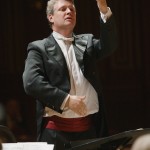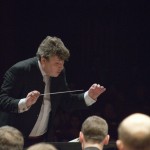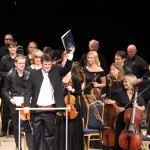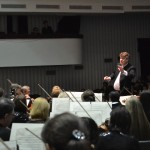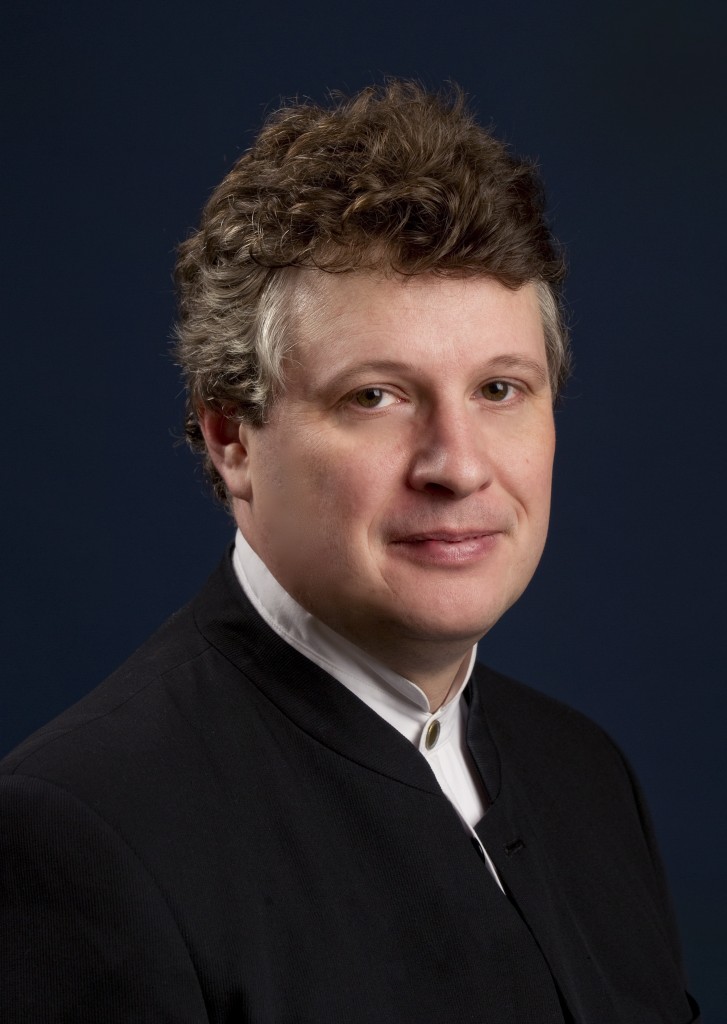
Alexander Walker has pursued a unique path, championing the music he loves, in places where it is not well-known, conducting pioneering performances all over the world. He has contributed to the rediscovery and re-evaluation of several significant composers with his innovative discography. In 2017, for the Elgar Society honoured him with their highest award, the Elgar Society Medal.
In the UK, he has conducted the Royal Philharmonic Orchestra in both concerts and the recording studio, conducting the prestigious Elgar Birthday concert with them in Malvern in 2011. He recently made a highly successful debut with the English Chamber Orchestra at London’s Cadogan Hall. He has also conducted City of London Sinfoniaand the BBC Philharmonic (with a concert broadcast on BBCRadio 3) and the New Queens Hall Orchestra in the UK. In Moscow he is a regular guest conductor with the legendary Russian State Symphony Orchestra, as well as with Symphony Orchestra New Russia (Music Director: Yuri Bashmet), the Russian Philharmonic and Musica Viva, conducting concerts at Moscow’s Tchaikovsky Hall, Zaryade Concert Hall and International Performing Arts Centre and elsewhere.
International appearances during the last couple of seasons have included concerts with Prague Philharmonia in the Dvořák Hall of the Rudolfinum, the Belgrade Philharmonic, Belgrade Strings (broadcasting on National Television with them), the Georges Enescu Philharmonic, Bucharest, North Hungarian Symphony Orchestra and Wrocław State Symphony Orchestra. Highlights of recent seasons have included a performance of Britten’s War Requiem to mark the 70 years since the invasion of Poland in Lublin, Poland and the first ever production in Turkey of an Opera by Benjamin Britten, conducting The Turn of the Screw for the Istanbul State Opera. He also recently conducted the first production of Julian Grant’s new opera Prophet and Loss for Oundle International Festival.
His pioneering recordings of orchestral music and music for violin and orchestra by Ignatz Waghalter and recordings of 12 symphonies by Havergal Brian on Naxos with the Royal Philharmonic Orchestra and Symphony Orchestra New Russia have won both critical and popular acclaim, as have his discs of contemporary British music.
After completing a music degree at Bristol University and post-graduate studies at the Guildhall School of Music and Drama in London, Alexander Walker studied with Ilya Musin at St. Petersburg Conservatoire and has since performed throughout the former Soviet Union where many of his concerts have been broadcast on National television and radio. He was Principal Guest Conductor of the Voronezh State Symphony Orchestra from 1999-2004. He is a regular guest conductor with the Mikkeli and Lappeenranta City Orchestras in Finland, and of the Esbjerg Ensemble and the Vestyjsk Sinfonieorkester in Denmark and of many orchestras throughout Poland, the Balkans, Turkey and Romania.
He works regularly at the Royal Opera House, Covent Garden, and has toured with the Royal Ballet to the Bolshoi and Mariinsky Theatres in Russia, throughout the USA including to the Metropolitan Operaand Kennedy Center, as well as to Singapore, Korea, Japan and Turkey. He has conducted performances of The Nutcracker at the Royal Opera House, Covent Garden, and other work for the Royal Ballet has included Giselle, Manon, Romeo and Juliet, and Swan Lake. He has also worked for the Finnish National Opera, conducting Kenneth Greve’s new production of Swan Lake, Cinderella for Scottish Ballet, Romeo and Juliet for Northern Ballet Theatre, a gala performance with Anastasia Volochkova at Sadler’s Wellsand a production of The Nutcracker for the Norwegian National Opera in Oslo.
His operatic repertoire includes the major operas of Verdi, Puccini and Mozart and Tchaikovsky as well as Tobias and the Angel, Carmen, Rusalka, Tristan und Isolde, Verbum Nobile (Moniuszko), A Life for the Tsar, Ariadne auf Naxos, and Gli Equivoci nel sembiante, Le Postillon de Lonjumeau (Adam), and Paradise Moscow. Companies he has worked for have included Opera North, Grange Park Opera, English Touring Opera, Oundle International Festival, Bampton Classical Opera, Chelsea Opera Group, European Chamber Opera, Opera de Baugé, London City Opera and the Ukrainian National Opera in Odessa.
A passionate advocate for British music abroad, he has also been responsible for organizing festivals featuring the music of Nielson in Russia and Karłowicz in Finland. He is highly regarded for his interpretations of Middle and East European classical and 19th and 20th century repertoire. An enthusiast for contemporary music, he has given first performances of music by Andrei Petrov, Aki-Yli Salomaki, Vladislav Uspenski, and many others.
He is conductor of Surrey Youth Orchestra, and in London teaches conducting at Trinity Laban Conservatoire, conducts Royal Academy of Music Junior Department Sinfonia and teaches at the Royal Academy of Music.
Enjoy this truly fascinating story of musical and historical discovery:
Rediscovering Ignatz Waghalter
Ignatz Waghalter
Born in Warsaw in 1881 as the fifteenth of twenty children of an impoverished but profoundly musically gifted Jewish family, Ignatz Waghalter displayed unusual talents from an early age. He began performing at local music halls and at homes of affluent Polish families at age six. At 17, he crossed the border illegally into Germany, heading to Berlin with the intention of studying there. Quickly discovered and championed by contemporary musicians (including legendary violin virtuoso Joseph Joachim), Waghalter won the Mendelssohn Prize – the highest award of the Berlin Academy of Art – as a 21-year-old up-and-coming composer.
He soon turned his attention to opera. At 31, he became the principal conductor of the Deutsches Opernhaus in Berlin and gained tremendous acclaim for his lyrical style. His first opera, Mandragola, premiered in 1914; the second, Jugend, three years later – both were widely praised and performed throughout Europe. However, as the social climate started changing in the 1920s, Waghalter found himself out of favor with the critics and under mounting political pressure, which eventually forced him to leave Germany and head for New York City.
In 1924, Waghalter was named the Principal Conductor and Music Director of the New York State Symphony Orchestra (which later became the New York Philharmonic) and quickly established himself as a major cultural figure in New York. However, despite critical and popular acclaim, he did not feel comfortable with the entertainment-oriented American approach to the arts and decided to return to Europe, where he remained widely recorded as a composer. As the Nazis rose to power in 1933, Waghalter and his wife fled to Czechoslovakia, and then to Austria. Shortly after the 1938 Nazi takeover of Austria, he escaped to America.
Back in New York, Waghalter was an impoverished refugee. His vehement support of the civil rights for African-Americans gained him friendship of many prominent leaders of the Harlem Renaissance, including NAACP’s James Weldon Johnson and African-American musician Alfred Jack Thomas, who actively supported his idea of the first-ever “American Negro Orchestra.” The ensemble was formed, but turned out short-lived for lack of financial support, and Waghalter found no other opportunities to pursue his career in music. The New World Suite, written for the American Negro Orchestra, had not been publicly premiered. Though he appeared occasionally as a guest conductor, his work was largely forgotten. He died in relative obscurity in New York in 1949.
Alma’s World: The Story of Alma Mahler-Werfel – Muse for an Era
A song recital and reflection over present times for mezzo soprano and chamber orchestra.
Conductor & Arrangements: Alexander Walker
Mezzo Soprano: Elisabeth Stützer
Ensemble: Flute/piccolo, oboe, 2 clarinets, 2 bassoons, 2 horns, accordion, harp, 2 violins, viola, cello, double bass (15 players)
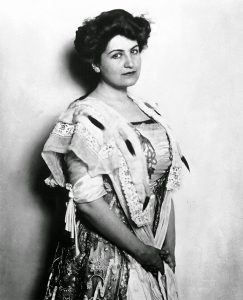 Alma Mahler-Werfel was an extraordinary woman who lived through extraordinary times. Musically gifted and beautiful, she became the centre of an extraordinary artistic world in Vienna in the early years of the twentieth century. Her admirers included the artists Gustav Klimt and Oskar Kokoschka, the composer Alexander Zemlinsky as well as Gustav Mahler, the architect Walter Gropius and the novelist Franz Werfel to each of whom she was married.
Alma Mahler-Werfel was an extraordinary woman who lived through extraordinary times. Musically gifted and beautiful, she became the centre of an extraordinary artistic world in Vienna in the early years of the twentieth century. Her admirers included the artists Gustav Klimt and Oskar Kokoschka, the composer Alexander Zemlinsky as well as Gustav Mahler, the architect Walter Gropius and the novelist Franz Werfel to each of whom she was married.
A talented composer herself, the programme tells the story of her life and loves through her music and her many friends and associates. Evoking the world of the Viennese salon, through songs by her many her companions, contemporaries, friends and lovers we discover a life of creative luxury, beauty, love, infatuation, conformism, social pressure, war, death and exile. It was a fragile world that seems to somehow resonate eerily today.
ALMA: The Program
Alexander Zemlinsky
Altdeutsches Minnelied (Des Knaben Wunderhorn)
Die Madchen mit den verbndenen Augen (Die drei Schwestern)
Gustav Mahler
Blicke mir nicht in die Lieder (Rückert)
Liebst du um Schönheit (Rückert)
Ich bin der Welt abhanden gekommen (Rückert)
Hans Pfitzner
Venus Mater (Dehmel)
Die Einsame (Eichendorff)
Arnold Schönberg
Gedenken
Der genügsame Liebhaber (Brettl Lieder)
Richard Strauss
Muttertändelei (Bürger)
Die Künstler (Kerr) (Kramerspiegel)
Alban Berg
Schlafen, schlafen (Hebbel)
Ferne Lieder (Rückert) (Jugendlieder)
Erich Korngold
Mariettas Lied (Schott)
(Die tote Stadt)
Liebesbriefchen (Honold)
Alma Mahler
Der Erkennende (Werfel) (Fünf Gesänge)
Bie dir ist es traut (Rilke) (Fünf Gesänge) no. 4
Walker achieves extraordinary intense playing that illuminates this music to its best advantage. Michael Cookson/Music Webb International
Brian: Symphonies 6, 28, 29 and 31/ Symphony Orchestra New Russia/ Naxos
Walker is a superb Brian conductor. He understands the very British nature and quality of this music and, moreover, phrases everything with the utmost care and an exquisite sense of legato without sacrificing clarity. Along with his wonderful sense of legato one hears very fine textural clarity without sounding overly fussy. () a very fine disc and thanks to the two world premiere recordings, a valuable one for Brian fanciers. The New Russian State Symphony plays this British music very well, too! – Lynn Ren Bayley / Fanfare
One thing this recording does is to reveal the strength and power of Brians orchestral imagination: The climaxes are absolutely tremendous. The excellent sound expands to accommodate these peaks, and again Walker is expert at controlling the rise and fall of the musical progress. The new Naxos disc is a must for Brian aficionados. – Philip Scott / Fanfare
The playing is confidenteven swaggering. The dark Russian color makes the performance seem more integrated. In all these works, [Walkers] direction makes them sound fascinating and, I suspect, as coherent as anyone ever will. – Don O’Connor / American Record Guide
The partnership between conductor Alexander Walker and the New Russia State Symphony Orchestra is a fruitful one. My expectations of high performance quality were fully met by these gripping accounts. Walker acheives extraordinary intense playing that illuminates this music to its best advantage. Theres excellent sound quality with the disc being especially well-balanced and with good clarity. This Naxos release is a prime recommendation, de rigeur for all Brian admirers and lovers of British music alike. – Michael Cookson / Music Webb International
This is an impressive and surprisingly successful record of some deeply impressive and wholly original music. Ones surprise is the quality and genuinely committed playing of the Moscow orchestra, which deliver performances of notable distinction, of music that is by no means easy to grasp and which poses problems to any ensemble that undertakes it. The undoubted success of this release has to be laid at the feet of Alexander Walker, who clearly has the grasp of this remarkably condensed and unique series of works.
For it is an extraordinary fact that, forty-plus years after Brians death, his music is appearing more and more as recordings and not merely from one particular company, although Naxos has in many ways led the way. It is through the medium of the gramophone that Brians music will stand the best chance of being understood, for the majority of it dates from his final decades, when his distinctive language had evolved to the point where it cannot be confused with that of any other composer. Not that his music is particularly obscure for a glance at the listing shows that two of these Symphonies are in a definite key but it remains highly concentrated, demanding a large orchestra (but not impossibly so), and it is full of changes that occur quite suddenly a typical fingerprint. But repeated hearings demonstrate that Brians logic is fully coherent and has the character of convincing the listener that a great deal has been expressed within a relatively short time. Not a note, therefore, is wasted: it is all germane to the musical argument, but it demands a conductor and an orchestra that can cope with this fiercely original style of composition. – Robert Matthew Walker / Classical Source
Waghalter: Orchestral Music/ Symphony Orchestra New Russia / Naxos
Its great fun, and conducted with both flair and love by Alexander Walker, who is responsible for the works (New World Suite) reconstruction. A very enjpyable release. – David Hurwitz / ClassicsToday.com
Brian: Symphonies 22-24/ Symphony Orchestra New Russia/ Naxos (Critics Choice: Gramphone Magazine)
Well, after hearing this remarkable disc by Walker and the New Russian State Symphony, Ive revised my opinion. It wasnt the message that was flawed in those earlier recordings but the messengers. Possibly, the musicians (and conductors) of that earlier time werent used to Brians peculiar mode of expression and aesthetic. Walker simply tears into these scores with the conviction of a True Disciple. Could some of the emotional output also be coming from the Russian musicians? Yes, of course, but again, the conductor sets the tone and Walker knows what he is about here. This is, quite simply, a remarkable disc. Highly recommended. – Lynn Ren Bayley/Fanfare Magazine
The performances here are very good. The New Russian State Symphony Orchestra sounds remarkably confident in Brians idiosyncratic sound world. The brass play very well, and the ensemble projects what have to be some very ungrateful string parts with astonishing conviction. Much of the credit must belong to conductor Alexander Walker, who keeps the music moving smartly along, and relishes the opportunities it offers for lyrical expression as well as instrumental color. Certainly this is one of the best issues in Naxos ongoing Brian cycle, especially as the sonics are also very tactile and vivid. Fans of the composer will rejoice. – David Hurwitz/Classics Today
Turbulent, untidy, unclassifiable yet gripping, Brians 32 symphonies, mostly written when he was over 70, are still rare beasts on record or in the concert hall. Three cheers, then, to (of all people) the New Russia State Symphony Orchestra under Alexander Walker for supplying feisty performances of the English mavericks Symphonies 22-24 a dark, dissonant triptych from the mid-1960s. For light relief theres also Brians English Suite No 1, composed 50 years earlier and full of whimsical quotations. – Richard Morrison/The Times
The Nutcracker / Norwegian National Opera and Ballet
The conductor Alexander Walker demonstrated complete command over both stage and orchestra. – Fredik Rutter/Verdens Gang, Oslo
Mendelssohn: Italian Symphony / English Chamber Orchestra / Cadogan Hall
A light and fleet account of the opening movement, demonstrated the orchestra skill with Mendelssohns transparent orchestral textures, bringing a vein of melancholy into the second movement whilst maintaining a delightful clarity. This second movement was clearly no funeral procession, but something far more subtle. Walker and his players brought out the echoes of Mendelssohns Midsummer Nights Dream in the third movement, before launching into a tarantella which impressed with its precision and control. – Robert Hugill / Planet Hugill
Waghalter: Complete works for solo violin/Irmina Trynkos / Royal Philharmonic Orchestra / Naxos
(Awarded a Supersonic Prize by Pizzicato Magazine, a designation rewarded for An Extraordinary and Masterly Achievement [Aussergewhnliche Spitzenleistung.] A Must-Buy!)
The outstanding support she (Irmina Trynkos) receives from the Royal Philharmonic orchestra under conductor Alexander Walker makes the case for the concerto and rhapsody even stronger. – Classical Lost and Found
Prophet and Loss / Oundle International Festival
Alexander Walkers conducting captured the drama inherent in Grants score while also emphasising its lyricism. – Opera
Le Postillon du Lonjumeau / Opera de Baug
The orchestra, led with spirit by the young Alexander Walker, ensured the ensemble tremendous pacing. He led a cast that clearly gripped the public, who were enthusiastic and clearly excited. – Forumopera
The Cunning Little Vixen / Oundle International Festival
Walkers players enchanted with a cavalcade of controlled, astute brass, refined woodwind and alluring low strings, all beautifully articulated. – Opera
Music for Symphony and Chamber Orchestra (including choral works):
Arnold, M.
Sweeney Todd Suite
The Return of Odysseus
Peterloo Overture
Symphony no. 5
Bach, J.S.
Christmas oratorio (Weinachtsoratorium), BWV 248
Magnificat, BWV 243
St. John Passion (Johannespassion), BWV 245
Suite no. 1, BWV 1066, C major
Suite no. 3, BWV 1068, D major
Barber, S.
Concerto for cello and orchestra
Bartok, B.
Concerto for Orchestra
Dance Suite
Music for Strings, Percussion and Celesta
Beethoven, L.
Concerto, Piano, No. 1, Op. 15, C major
Concerto, Piano, No. 3, Op. 37, C minor
Concerto, Piano, No. 4, Op. 58. G major
Concerto, Piano, No. 5, Op. 73, E-flat major (Emperor)
Concerto, Violin, Op. 61, D major
Concerto, Violin, Cello, Piano, Op. 56, C major (Triple)
Consecration of the House
Coriolan Overture, Op. 62
Egmont Overture, Op. 84
Fantasia for piano, chorus and orchestra, Op. 80
Leonore overture no. 3
Symphony No. 1, Op. 21, C major
Symphony No. 2, Op. 36, D major
Symphony No. 3, Op. 55, E-flat major
Symphony No. 4, Op. 60, B-flat major
Symphony No. 5, Op. 67, C minor
Symphony No. 6, Op. 68, F major (Pastorale)
Symphony No. 7, Op. 92, A major
Symphony No. 8, Op. F major
Symphony No. 9, Op. 125, D minor
Berlioz, H.
Harold in Italy, Op. 16
Les franc-juges
Roman Carnival
Symphonie fantastique, Op. 14
Te Deum
Bernstein, L.
Candide: Overture
On the Town: Three Dance Episodes
West Side Story: Symphonic Dances
Bizet, G.
Symphony No. 1, C major
Carmen Suite no. 2
Borodin, A.
In the Steppes of Central Asia
Brahms, J.
Academic festival Overture
Concerto, piano, no. 1, Op. 15 D minor
Concerto, piano, no. 2, Op. 83, B-flat major
Concerto, violin, Op. 77, D major
Concerto, violin and violoncello, Op. 102
Ein deutsches Requiem, op. 45
Hungarian Dances 1-5
Liebeslieder Walzer (orch. Brahms)
Nnie
Schicksalslied
Symphony No. 1, Op. 68, C minor
Symphony No.2, Op.73, D major
Symphony No. 3, Op. 90, F major
Symphony No. 4, Op. 98, E minor
Variations on a theme by Haydn
Brian, H.
English Suite no. 1
Symphony no. 6
Symphony no. 8
Symphony no. 21
Symphony no. 22
Symphony no. 23
Symphony no. 24
Symphony no. 26
Symphony no. 28
Symphony no. 29
Symphony no. 31
Britten, B.
Concerto, piano, no. 1, Op. 13
Concerto, violin, no. 1, Op. 15
Peter Grimes: Four Sea Interludes
Suite on English folk tunes, op. 90 A time there was..
Soirees Musicales, Op. 9 (after Rossini)
Sinfonietta, Op. 1
Young Persons Guide to the Orchestra, Op. 34
War requiem, Op. 66
Bruch, M.
Concerto, violin, no. 1, Op. 26, G minor
Romance, Viola and orchestra
Bruckner, A.
Symphony no. 4, E-flat major (Romantic)
Symphony no. 7, E major (1883 version)
Chabrier, E.
Espaa
Chausson, E.
Pome, Op, 25
Chopin, F.
Concerto, piano, no. 1, Op. 11 E minor
Concerto, piano, no. 2, Op. 21 F minor
Copland, A.
Appalachian Spring: Suite (both versions)
Billy the Kid: Suite
Rodeo: Four Dance Episodes
Symphony no. 3
Debussy, C.
La Mer
Lapres midi dun faune
Delius, F.
On Hearing the First Cuckoo in Spring
Summer Night on the River
The Walk to the Paradise Garden
Dvo?k, A.
Amid nature, Op. 91 (overture)
Carnival Overture, Op. 92
Concerto, violoncello, Op. 67, B minor
Concerto, violin, Op. 53 A minor
Legends
Noonday Witch, Op. 108
Symphony no. 5, Op. 76, F major
Symphony no. 6, Op. 60, D major
Symphony no. 7, Op. 70, D minor
Symphony no. 8, Op. 88, G major
Symphony no. 9, Op. 95, E minor
Te Deum
Elgar, E.
Imperial March
Enigma Variations, op. 36
Falstaff, Op. 68
Overture: Froissart
The Dream of Gerontius
The Kingdom
The Musicmakers
Concerto, cello, op. 85, E minor
Concerto, violin, op. 61, B minor
Polonia, op. 76
The Spirit of England
Symphony no. 1, Op. 55 in A-flat major
Symphony no. 2, Op. 63, E-flat major
Falla, Manuel de
El amor brujo, Ballet Suite
Faure, G.
Requiem, op. 48
Franck
Le Chasseur Maudit
Les Djinns for piano and orchestra
Symphony in D minor
Gershwin, G.
American in Paris
I Got Rhythm Variations
Porgy and Bess: Symphonic Picture
Rhapsody in Blue
Glinka, M.
Ruslan and Ludmilla: Overture, Dances, March etc.
Grieg, E.
Concerto for piano and orchestra
Peer Gynt: Suite no. 1
Grof, F.
Grand Canyon suite
Handel, G.F.
Coronation Anthems
Dettingen Te Deum
Messiah
Samson
Harper, P.
Mezame (1st perf.)
Haydn, F.
Concerto, cello, no.1, Hob.VIIb, C major
The Creation
The Seasons
Symphony no. 18, G major
Symphony no. 20, C major
Symphony no. 86, D major
Symphony no. 104, D major (London)
Holm, P.
Pezzo concertante, Op. 30
Holst, G.
The Perfect Fool, Ballet Music
The Planets
Kodaly, Z.
Galanta Dances
Korngold, E.
Concerto, violin
Liszt, F.
Hungarian rhapsody no. 1, F minor
Concerto, piano, no. 1, E-flat major
Les prludes
Totentanz for piano and orchestra
Lyadov, A.
The Enchanted Lake, Op. 62
Kikimora, Op. 63
Baba Ya
Macrae, S.
Boreraig
Mahler, G.
Ruckert Lieder
Symphony no. 1, D major
Symphony no. 4, G major
Symphony no. 6, A minor
MacMillan, J.
Into the Ferment
Tryst
Martin, F.
Mozartiana
Martinu, B.
Sinfonia la jolla
Mendelssohn, F.
Concerto, violin, Op. 64, E minor
The Hebrides (Fingals Cave), Op. 26
Midsummer Nights Dream
Symphony No. 3, Op. 56, A minor (Scotch)
Symphony No. 4, Op. 90, A major (Italian)
Symphony No. 5, Op. , (Reformation)
Milhaud, D.
Le boeuf sur le toit
Mozart, W. A.
Concerto, Clarinet, K.622, A major
Concerto, Piano, No. 9, K.271, E-flat major
Concerto, Piano, no. 20, K.466 , D minor
Concerto, Piano, no. 21, K.467 , C major
Concerto, Piano, no. 23, K.488, A major
Concerto, Piano, no. 24, K. 491, C minor
Concerto, Piano, no. 25, K. 503, C major
Concerto, Piano, no. 27, K. 595, B-flat major
Concerto 2 pianos, K. 316a (365) E-flat major
Concerto, Violin, No. 3, K. 216, G major
Cosi fan tutte, K. 588: Overture
Don Giovanni, K. 527, Overture
Mass, K. 317, C major (Coronation)
Requiem, K. 626
Sinfonia Concertante, Vln and Viola, K. 320.d,
Sinfonia concertante, winds
Symphony No. 35, K. 385, D major (Haffner)
Symphony No. 36, K. 425, C major (Linz)
Symphony No. 38, K. 504, D major (Prague)
Symphony No. 39, K. 543, E-flat major
Symphony No. 40, K. 550, G minor
Symphony No. 41, K.551, C major (Jupiter)
Mussorgsky, M.
Night on a Bald Mountain (arr. Rimsky-Korsakov)
Pictures at an Exhibition (arr. Ravel)
Nielson, C.
Concerto for flute
Symphony No. 5
Orff, C.
Carmina burana
Paganini, N.
Concerto, violin, no. 1, Op. 6, D major
Petrov, A.
Memoria (1st UK perf.)
Prokofiev, S.
The Love for Three Oranges: Suite
Symphony No. 1, Op. 25
Poulenc
Gloria
Rachmaninov, S.
The Bells, op. 35
Concerto, piano no. 1, Op. 1, F-sharp minor
Concerto, Piano No. 2, Op. 18, C minor
Concerto, Piano No. 3,
Rhapsody on a Theme of Paganini, Op. 43
Symphonic Dances Op. 45
Symphony No. 1, Op. 13, D minor
Symphony No. 2, Op. 27, E minor
Symphony No. 3, Op. 44, A minor
Ravel, M.
Bolero
Concerto, piano, G major
Concerto, piano (l. hand) D major
La Valse
Ma mere lOye
Pavane pour une infante dfunte
Le tombeau de Couperin
Rimsky-Korsakov, N.
Cappriccio Espagnol, Op. 34
Sheharazade, Op. 35
Tsar Sultan: Suite; also Arias from the Opera
The Snow Queen: Arias and Excerpts
Rodrigo, J.
Concierto dArajuez
Rossini, G.
Il Barbiere di Siviglia: Overture
La Cenerentola: Overture
La Gazza Ladra: Overture
Litaliana in Algeri: Overture
Saint-Saens, C.
Introduction and Rondo Capriccioso
Concerto, Piano No. 2, Op. 22, G minor
Concerto, Violin No. 3, Op. 61, B minor
Symphony No. 3, Op. 78, C minor
Sarasate, P.
Navarra, 2 Violins and Orchestra
Schubert, F.
Symphony No. 4, D. 417, C minor, Tragic
Symphony No. 5, D. 485, B-flat major
Symphony No. 6, D. 589, C major
Symphony No. 8, D. 759, B minor (Unfinished)
Symphony N. 9, D.944, C major (The Great)
Schumann, R.
Concerto, violoncello, op. 129, A minor
Symphony no. 3, Op. 97, E-flat major (Rhenish)
Symphony no. 4, Op. 120, D minor
Shostakovitch, D.
Concerto No. 1, Violin, Op. 99
Concerto No. 1, cello
Concerto No. 2, piano
Festive Overture, Op. 96
Symphony No. 1, Op. 10
Symphony No. 5, Op. 47
Symphony No. 6, Op. 53
Symphony no. 7, Op. 60 (Leningrad)
Symphony No. 8, Op. 65
Symphony No. 10, Op. 93
Sibelius, J.
Finlandia
Karelia Suite
Lemminkainen Suite
Symphony no. 1, Op. 39, E minor
Symphony no. 2, Op. 43, D major
Symphony no. 5, Op. 82, E-flat major
Symphony no. 7, Op. 105, C major
Concerto for violin and orchestra, op. 47, D minor
Smetana, B.
The Bartered Bride: Overture
The Moldau (Vltava)
Strauss, J. jnr.
Fledermaus: Overture
Various Waltzes and Marches
Strauss, R.
Concerto, Oboe, D major
Death and transfiguration (Tod und Veklarung), Op. 24
Don Juan, Op. 20
Four last songs
Der Rosenkavalier: Suite
Till Eulenspiegels lustige Streiche, Op. 28
Stravinsky, I.
Danses concertantes
Le Sacre du printemps
The Firbird: Suite (1919)
Petrushka (1947)
Scnes de Ballet
Suites for Orchestra
Sviridov, G.
The Snowstorm
Tchaikovsky, P.
Cappriccio Italien, Op. 45
Concerto, piano no. 1, op. 23, B-flat minor
Concerto, violin, Op. 35, D major
Francesca da Rimini, op. 32
Hamlet, Op. 67
Manfred, Op. 58
Marche slave, Op. 31
The Nutcracker: Suite, op. 71a
Overture, 1812, Op. 49
Romeo and Juliet: Fantasy Overture
Sleeping Beauty, Suite, op. 66a.
Suite no. 3, Op. 55
Swan Lake, Suite, op. 20
Symphony No. 1, Op. 13, G minor
Symphony No. 2, Op. 17, C minor
Symphony No. 4, Op. 36, F minor
Symphony No. 5, Op. 64, E minor
Symphony No. 6, Op. 74, B minor (Pathetique)
Variations on a Rococo Theme, Op. 33
Uspensky, V.
Music for Percussion, piano and strings (1st UK perf.)
Vaughan-Williams, R.
Symphony No. 5, D major
The Lark Ascending
The Wasps: Overture and Incidental Music
Waghalter, I.
Concerto for violin and orchestra (1st recording)
Mandragola: Overture and Intermezzo
Masaryks Peace March (1st recording)
New World Suite (reconstructed A.Walker) (1st recording and performance)
Rhapsodie for violin and orchestra (1st recording)
Wagner, R.
Rienzi Overture
Tristan und Isolde: Prelude und Lieberstod
Siegfried-Idyl
Wesendonck Songs
Walker, Robin
Funeral March: The Great Rock is Dead (1st recording)
Prelude: Oddyseus on Ogygia (1st recording)
The Stone King (1st recording)
The Stone Maker (1st recording)
Weber, C.
Oberon Overture
Concerto, clarinet op. 73. F minor
Music for String Orchestra:
Bach, J. S.
Brandenburg Concerto No. 2, BWV. 1046, F major
Brandenburg Concerto No. 3, BWV. 1047, G major
Concerto, keyboard, No. 1, BWV 1052, D minor
Concerto, violin no. 1, BWV 1041, A minor
Concerto, violin no. 2, BWC 1042, E major
Concerto, 2 violins, BWV 1043, D minor
Concerto, violin and oboe, BWV 1060
Suite No. 2, BWV 1067, B minor
Barber, S.
Adagio for Strings
Birtwistle, H.
Endless Parade
Bliss, A.
Music for Strings
Bottesini, G.
Concertino for Double Bass in C minor
Bridge, F.
Suite for Strings
Britten, B.
Simple Symphony
Variations on a Theme of Frank Bridge
Charlton, A.
Concertino (1st perf.)
Dvo?k , A.
Serenade for Strings, Op. 22, E major
Elgar, E.
Elegy, Op. 58
Serenade, Op. 20, E minor
Falik, Y.
Sinfonietta (1st UK and Finnish perf.))
Finzi, G.
Concerto for Clarinet and String Orchestra
Eclogue, for Piano and Strings
Prelude
Romance
Gardner, J.
Sinfonia Piccola
Grieg, E.
Holberg Suite
Holst, G.
St. Pauls Suite
Ives, C.
The Unanswered Question
Karlowicz, M.
Serenada, op. 2
Mozart W.A.
Adagio and Fugue for Strings, K. 546, C minor
Divertimento in D major, K. 136
Serenade in G, Eine Kleine Nacht Musik
Prokofiev, S.
Visions Fugitives
Purcell, H.
Chacony for Strings
Tchaikovsky, P.
Serenade for String Orchestra, Op. 48
Souvenir de Florence, Op. 70
Tippet, M.
Little Music
Warlock, P.
Capriol Suite
Yli-Salomaki, A.
Concerto for clarinet and strings (1st perf.)
Orchestral Ensemble:
Birtwistle, H.
Slow Frieze
Boulez, P.
Memoriale
Dvorak, A.
Serenade for Wind, Op. 44.
Kurtag, G.
Vier Capriccios
Milhaud, D.
La Creation du Monde
Strauss, R.
Serenade, Op.7
Stravinsky I.
Concerto in E-flat, Dumbarton Oaks
Varese, E.
Integrales
Full Length Ballets:
Adam
Giselle
List/Lanchberry
Mayerling
Massenet/Lanchberry
Manon
Prokofiev
Cinderella
Romeo and Juliet
Tchaikovsky, P.
The Nutcracker
Swan Lake
Sleeping Beauty
Opera:
Adam, A.
Le Postillon de Lonjumeau
Bizet, G.
Carmen
Britten, B.
Turn of the Screw (Turkish premiere)
Dove
Tobias and the Angel
Grant, Julian
Prophet and Loss (first performance)
Hoddinott, A.
Tower (first performance)
Jan?ek
The Cunning Little Vixen
McElwaine, R.
The Bear (first performance)
Monisuzko, S.
Verbum Nobile
Straszny Dwor
Puccini, G.
La Boheme
Madama Butterfly
Tosca
Mozart, W. A.
Cosi fan tutte
Idomeneo
Le nozze di Figaro
Die Zauberflte
Storace, S.
The Comedy of Errors
Strauss, J.
Die Fledermaus
Strauss, R.
Ariadne auf Naxos
Tchaikovsky, P.
Eugene Onegin
Pique Dame
Waghalter
Jugend
Mandragola
Wagner, R.
Tristan und Isolde
Verdi, G.
La Traviata



